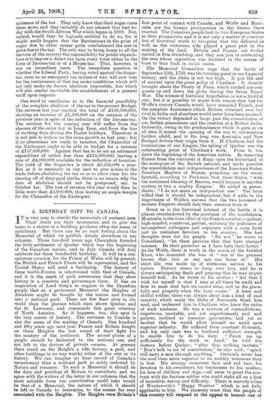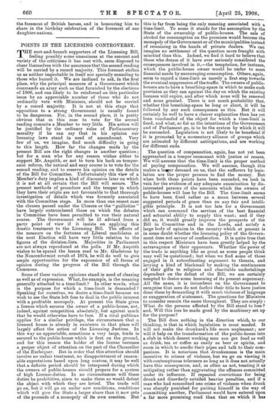A BIRTHDAY GIFT TO CANADA.
T is very easy to overdo the memorials of eminent men.
Their deeds are their monument, and to give the name to a statue or a building produces often the sense of anticlimax. But there can be no such feeling about the Memorial of which we publish details elsewhere in our columns. Three hundred years ago Champlain founded the little settlement of Quebec which was the beginning of the Canadian nation, and in July Canada will duly celebrate her three hundredth birthday. It will be a con- spicuous occasion, for the Prince of Wales will be present, the British and French Fleets will be represented, and the Milted States will send a battleship. The history of three world-Powers is intertwined with that of Canada, and it is the merit of such ceremonies that they show history in a concrete and picturesque form. It was an inspiration of Lord Grey's to suggest to the Canadian people that as a permanent Memorial the Heights of Abraham might be bought by the nation and formed into a national park. There are few finer sites in the world than the plateau which rises above Quebec and the St. Lawrence, and commands this great riverway of North America. As it happens, too, this spot is the very centre of history. The entrance to Canada is also the scene of the making of Canada. One hundred and fifty years ago next year France and Britain fought on these Heights the last round of their fight for the mastery of the continent. The sacred places of a people should be dedicated to the national use, and not left to the devices of private owners. At present there stand on the Heights a rifle factory, a gaol, and other buildings in no way worthy either of the site or its history. We can imagine no finer record of Canada's tercentenary than a national park so nobly endowed by Nature and romance. To such a Memorial it should be the duty and privilege of Britain to contribute, and we agree with the writers of the letter in our columns that the most suitable form our contribution could take would be that of a Memorial, the nature of which it should be left to Canada to determine, to the names for ever associated with the Heights. The Heights were Britain's first point of contact with Canada, and Wolfe and Mont, calm are the human protagonists in the drama there enacted. The Canadian people look to two European States as their progenitors, and it is not only a matter of courtesy but of historical truth to recognise that the defeated as well as the victorious side played a great part in the making of the land. Britain and France are to-day united in firm friendship, and they can join in celebrating the men whose opposition was destined in the course of time to bear fruit in racial union.
The Memorial Committee urge that the battle of September 13th, 1759, was the turning-point in our Imperial history, and the claim is not too high. It put the seal of success upon the great policy of Chatham. It directly brought about the Treaty of Paris, which ratified our con- quests up and down the globe during the Seven Years' War. The science of historical hypothetics is not a fruitful one ; but it is possible to argue with reason that but for Wolfe's victory Canada would have remained French, and the complete dominance which Britain obtained over her rival in India and elsewhere would never have been attained. On the victory depended in large part the consolidation of our Indian possessions and the creation of a British India. Indirectly, owing to the predominance which it gave us on all seas, it meant the opening of the way to colonisation further afield, and in the long run Australia and New Zealand deduce their origin from it. If Chatham laid the foundations of our Empire, the taking of Quebec was the culminating point of Chatham's work. From it, too, dates the beginning of the American nation. By removing France from the continent it flung open the hinterland to the enterprise of the British colonist, and made possible the consolidation and independence of the American States. Jonathan Mayhew of Boston, preaching on the event, foretold, according to Parkman, that these States, " with the continued blessing of Heaven, would become in another century or two a mighty Empire." He added in paren- thesis: "I do not mean an independent one." The fates willed that it should be independent, but it adds to the importance of Wolfe's success that the two foremost of modern Empires should date their creation Irons it.
Great as is the historical interest of the battle, it is almost overshadowed by the greatness of the combatants. Montcalm is the beau-ideal of the French cavalier,—gallant, high-minded, courteous, patient, enduring the jealousies of incompetent colleagues and superiors with a. calm faith and an unshaken devotion to his country. His last thoughts were for his people. "Do not," he wrote to Towushend, "let them perceive that they have changed masters. Be their protector as I have been their father." As for Wolfe, there is truth in the words of the faithful Knox, who lamented the loss of "one of the greatest heroes that this or any age can boast of." His short life was made up of strenuous service to his nation. Destiny seems to hang over him, and he is always anticipating death and praying that he may acquit himself well. As he wrote to his mother : "All that I wish for myself is that I may at all times be ready and firm to meet that fate we cannot shun, and to die grace- fully and properly when the hour comes." A. keen and skilful soldier, there was always about him a kind of cool insanity, which made the Duke of Newcastle think bins mad, and endeared him to Chatham, who knew the value of such madness. He was a mixture of contradictions, impetuous, excitable, and yet superhumanly cool and patient, inclined to innocent gasconades, and yet so modest that he would allow himself no merit save superior industry. He suffered from constant ill-health, and. his only care was to husband sufficient strength to enable bins to do his duty. "Patch me up sufficiently for the work in hand," he told the doctors before Quebec; "after that nothing matters." "Don't talk to me of constitution," he also said ; "spirit will carry a man through anything." Certainly never has the soul risen more superior to its earthly tenement than in him. His strange immature face and red hair, his devotion to his sweetheart, his tenderness to his mother, his love of children and dogs,—all seem to point the con- trast with the fearless soldier who could stake all on a feat of incredible daring and difficulty. There is scarcely a line of Wordsworth's "Happy Warrior" which is not fully applicable to him. We sincerely trust that the people of this country will respond to the appeal to honour one of the foremost of British heroes, and in honouring him to share in the birthday celebration of the foremost of our daughter-nations.























































 Previous page
Previous page